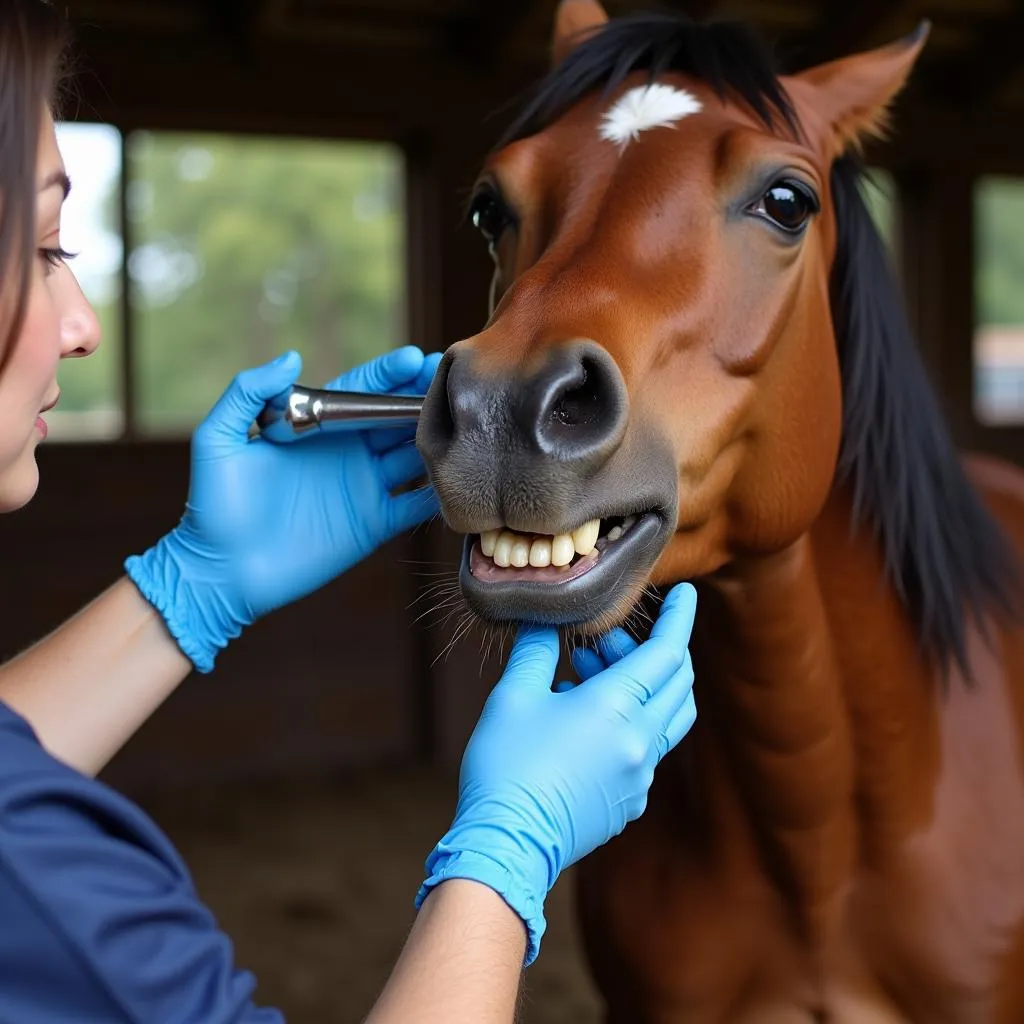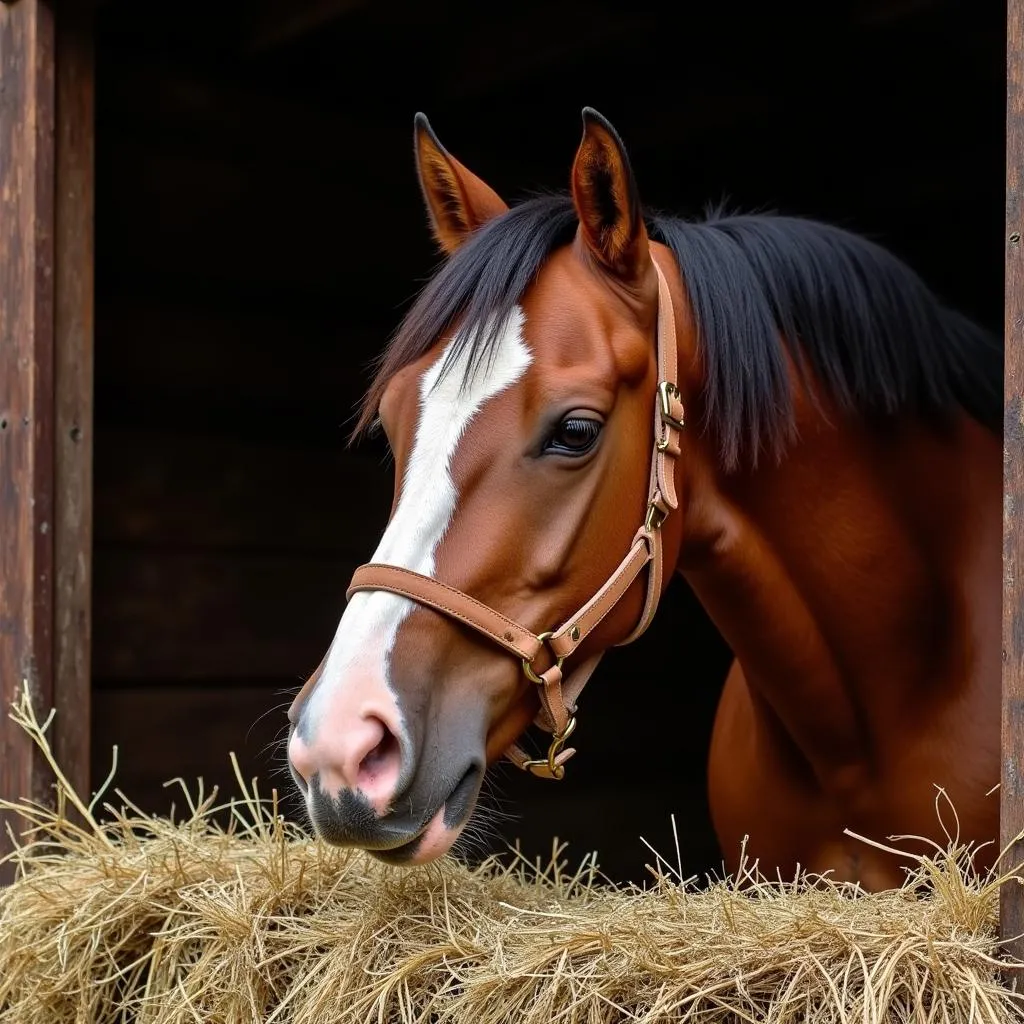Brome grass is a cool-season perennial grass commonly grown for livestock, including horses. But Is Brome Grass Good For Horses? The answer, like most things in equine nutrition, is not a simple yes or no. It depends on several factors, including your horse’s age, activity level, and overall health condition.
Understanding Brome Grass and its Nutritional Value
Brome grass, specifically smooth bromegrass (Bromus inermis), is favored for its hardiness, adaptability to various climates, and relatively good nutritional profile. It’s a decent source of fiber, which is crucial for a horse’s digestive health. However, compared to other popular forages like timothy hay or orchard grass, brome grass tends to be higher in calories and protein. This can be beneficial for certain horses but may pose problems for others.
Benefits of Brome Grass for Horses
- Good Source of Fiber: Brome grass offers a good amount of fiber, promoting healthy digestion and helping prevent colic.
- Suitable for Easy Keepers: The higher calorie content can be advantageous for horses that struggle to maintain weight or those with higher energy requirements, such as lactating mares or performance horses.
- Adaptable and Easy to Grow: Brome grass is known for its hardiness and ability to thrive in a variety of climates and soil conditions, making it a readily available and cost-effective forage option for horse owners.
Potential Drawbacks of Brome Grass
- High Calorie Content: While beneficial for some, the higher calorie content in brome grass can lead to weight gain in horses prone to obesity, like ponies or those with metabolic disorders like Insulin Resistance.
- Risk of Impaction Colic: Brome grass, particularly mature brome, tends to be more stemmy and less palatable than other hays. This can increase the risk of impaction colic if horses don’t drink enough water.
- Lower in Certain Nutrients: Compared to other forages, brome can be lower in essential nutrients like calcium and vitamin A.
When is Brome Grass a Good Choice for Your Horse?
- Young, Growing Horses: The higher protein and calorie content can support the nutritional needs of young horses during their growth spurt.
- Performance Horses: Horses in strenuous work may benefit from the additional calories and protein offered by brome grass to fuel their energy needs.
- Hard Keepers: Horses that struggle to maintain weight can benefit from the calorie-dense nature of brome grass.
When to Exercise Caution with Brome Grass
- Overweight or Obese Horses: For these horses, brome grass may contribute to unwanted weight gain and exacerbate health issues related to obesity.
- Horses with Metabolic Issues: Brome grass can be problematic for horses with metabolic disorders like Insulin Resistance or Cushing’s disease due to its higher sugar content compared to other forages.
- Horses with Dental Problems: Horses with dental problems may find brome grass more difficult to chew, potentially leading to digestive upset or choke.
Tips for Feeding Brome Grass to Horses
- Choose High-Quality Hay: Opt for brome grass hay that is green and leafy, free from mold or dust.
- Soak Before Feeding: Soaking brome grass hay can help reduce its sugar content and make it easier to chew, particularly for horses with dental issues.
- Monitor Weight and Body Condition: Regularly assess your horse’s weight and body condition to ensure they’re maintaining a healthy weight on brome grass.
- Provide Ample Fresh Water: Always have fresh, clean water available for your horse, especially when feeding brome grass, to promote proper digestion and prevent impaction colic.
- Consult Your Veterinarian: It’s essential to consult with your veterinarian regarding your horse’s specific dietary needs and determine if brome grass is an appropriate forage choice for them.
 Veterinarian Examining a Horse's Teeth
Veterinarian Examining a Horse's Teeth
Conclusion
Is brome grass good for horses? The answer depends on your individual horse and their specific needs. When chosen and fed thoughtfully, brome grass can be a suitable forage option for some horses. However, it’s crucial to be aware of its potential drawbacks and consult your veterinarian to determine if it’s the right choice for your equine companion.
FAQs
- Can I feed brome grass hay to my pregnant mare? While brome grass can provide necessary calories, it’s essential to monitor intake to avoid excessive weight gain. Consult your vet for personalized advice.
- My horse has a history of laminitis. Is brome grass safe? No, brome grass is not recommended for horses prone to laminitis due to its higher sugar content.
- How much brome grass should I feed my horse per day? The amount varies depending on your horse’s weight, activity level, and other factors. A good starting point is 1.5% – 2% of their body weight in forage per day, but always consult your veterinarian for guidance.
Need more help? Contact us!
For any further questions about your horse’s nutrition or to learn more about the best feeding practices, don’t hesitate to reach out to us. Our expert team at Justus Horses USA is always happy to assist you.
Phone: 0772127271
Email: [email protected]
Address: QGM2+WX2, Vị Trung, Vị Thuỷ, Hậu Giang, Việt Nam
We have a 24/7 customer service team ready to assist you.
